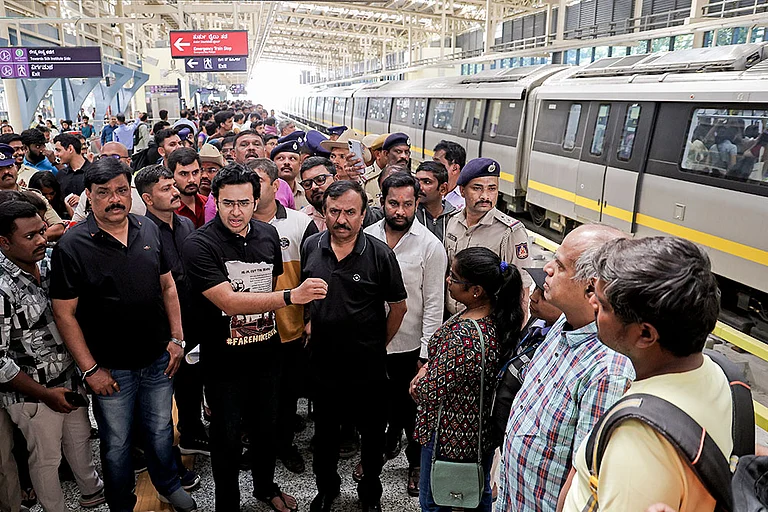Recently, in one of the Indian dailies, I read the simplest account yet of what the revolution of the Serbian people against Slobodan Milosevic was all about. The account read: "This time, the Serbians chose to go with the Americans, already on the right side of history, rather than their old friends and allies, the Russians. They probably know it's the only way they'll survive". How very simple. And how very wrong. For all their influence in the world, and for all they did or didn't do to Yugoslavia, these countries were irrelevant to the people who converged on Belgrade from all over Serbia on October 5. Each of them had a personal account to settle with Slobo. Until Milosevic's rule, they were on the right side of history. He changed that. Rising to power on their pride, he took it away from them. And they went to the streets of Belgrade to reclaim it.
I had a ring-side seat in Belgrade during Slobo's grab for power and I wish I could have been there with those who destroyed his trappings of power. I too have an account to settle with him. He destroyed my Yugoslavia. Gifted by nothing more than pathological insensitivity, and driven by nothing more than the desire to dominate, he set sail to his vision as the new ruler of Yugoslavia in 1987. He used the genuine complaint the Serbs had in Kosovo to grab power in Serbia-rising on the wave of Serb nationalism he unleashed and whipped up, and relying on outright political criminals to execute his devious designs.
Emboldened, Slobo thought the same methods would work to subdue the entire country. After bringing down the provincial government in Vojvodina and the government of Montenegro, he attacked the Yugoslav federation through attempts to grab control of the Communist Party machinery, and by sending organised mobs to the capitals of other republics to try to bring down their leaders in the way he did it in Vojvodina and Montenegro. Both failed. He destroyed the Party, paving the way for the destruction of Yugoslavia; his mob was prevented from reaching Ljubljana by the Slovenian police. In seething rage, he broke economic relations with Slovenia, still a part of the same country.
Through all this, most of Serbia's media spewed venom on the Croats and Slovenes. Their media responded. Slobo's worst deception was to show that he was out to save Yugoslavia, while actually destroying the country with his political terrorism. Small wonder that when the first multi-party elections after 50 years were held in all republics in 1990, Croatia, Slovenia and Bosnia-Herzegovina all elected their nationalists, most with separatist agendas, to lead them in repelling Slobo's attacks. For years, most Serbs would claim that Slovene and Croat separatisms destroyed Yugoslavia. But this view just disregards the fact that it was Slobo's policies which brought separatists to power. I believe Yugoslavia would've still existed had it not been for Milosevic.
In the four years of Yugoslav wars that followed, the criminal character of Slobo's regime came fully into its own. The Yugoslav army, once a highly respectable institution, was pushed into the conflict by both Slobo, in his pretense of "saving" Yugoslavia, and by the separatists for whom provoking conflicts with the army was a part of an independence strategy. Confused and battered, without any real guidance and leadership, the army quickly lost the historic chance to turn against the real source of conflict and save Yugoslavia. That Slobo was not even a Serb nationalist became clear from his treatment of the Serbs outside Serbia. He first emboldened them in Croatia to rise against Tudjman's regime, only to deliver them to Tudjman in 1995 and let all of them be ethnically cleansed from Croatia without moving a finger. He engineered the strategies which Bosnian Serbs followed, only to impose an embargo on them when he thought that distancing himself from their crimes will bolster his image abroad. The painful thing during those war years, as well as during the conflict in Kosovo, for any decent Serb was to accept the very idea that some people of his nation may be committing atrocities.
As far as Slobo's rule in Yugoslavia was concerned, only the Greek word, kakistokratia-rule of the worst-best describes it. All the assets of the state were only to be used to support his rule. Increasingly, one started to hear from the normal people that "Serbia was under internal occupation." It is an irony that the most determined Western attempt to unseat him came on account of Kosovo, the strongest case Serbs had. It was their historic land, and yet they were losing it, due to the rapidly growing Albanian population and its aspirations. Slobo mishandled that case from the beginning. When the armed rebellion started in Kosovo in 1998 (I will forever suspect, with Western aid), he could do nothing else but to try to crush it by force. And that was his doom, for it was where the West waited for him. But the bombardment that followed was as wrong as Slobo's policies in Kosovo. It was a case of illegal use of force which constituted an act of aggression against Yugoslavia. It was the time to deal not with Slobo but with Tomahawk missiles. And all this created an opportunity for Slobo to actually strengthen his position.
So it took another year until he felt, stupidly, sure enough to change the Constitution overnight to provide for his continuation and even go for early elections. He was rudely awakened by the reaction of the people. Even the usual rigging didn't help him this time. Then showing his true face, he tried to cheat as he ruled-arrogantly, brazenly. In the end, it was a measure of historic justice that he, who introduced crowds in Yugoslav politics, was deposed by a crowd. But this time, the crowd was on the right side of history.
(The author, a former Yugoslav diplomat, is currently based in Delhi)


























